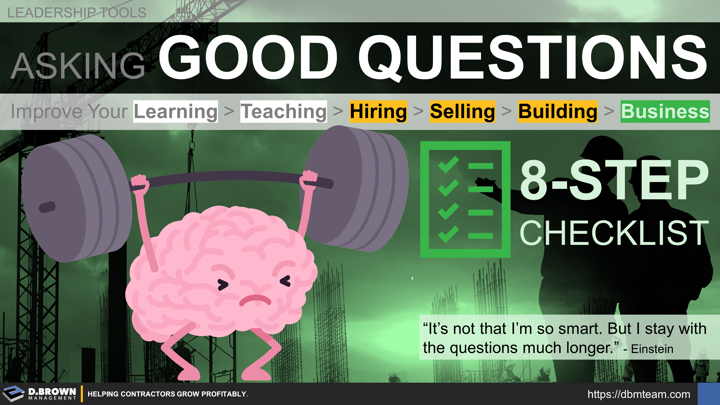The discipline of formulating good questions often answers the original question and many more.
During a week-long team development meeting in 2014, Steve Jost led the DBM Team through a process of asking "Good Questions" of ourselves, each other, and of our clients. What emerged was an 8-step checklist for formulating then asking good questions.
This checklist has been revised slightly over the years but the fundamentals have held up.
- Form well thought-out questions with a hypothesis already formed, demonstrating to the other party that an appropriate level of thought, reasoning, and analysis has been put into the question. Writing out your questions will help clarify them even if the discussion is verbal. (Writing to Clarify Thoughts)
- Create a bigger context for the questions by thinking through them in the context of overall strategy, cross-functional workflows, and broader value streams extending one or two levels beyond your company. This allows for “and-then” conversations and demonstrates that a proper level of thought has been put into questions. (Levels of Value Stream)
- Work to frame the questions in the best context the other party can understand. Use analogies to relate the question to something the other party is most familiar with.
- Approach the questioning with a positive attitude. Avoid negativity or having the questioning seem like an interrogation.
- Set up the right timing for the questioning when both parties are in the right frame of mind. At a minimum make sure the other party is in the right frame of mind.
- Like physical exercise, start by asking questions in progressive levels of difficulty to warm-up the brain, conversation, and relationships.
- After warming up, ask questions to the right level of detail, typically starting in a range where the other party is most comfortable then progressively working up toward a broader perspective or down toward a more granular level of detail. (Levels of Value Stream)
- Discuss until all parties fully understand each other including where they are and are not aligned. Thoroughly summarize at the end of discussion then systematically debate the misalignments, if any, while being clear on who has decision rights if consensus can not be reached through debate. (5D Facilitation Process / Writing to Clarify Thoughts)
Asking Good Questions Improves Every Aspect of Growing a Contracting Business:
- Learning - knowing that if you are growing at 15% per year, what you do in your job role will likely change nearly 80% every 5 years.
- Teaching - knowing that others on your team will be going through a similar learning curve and the best way to help them develop is by asking targeted and progressively more difficult questions.
- Strategy - knowing the 5 strategic choices to make and continually asking versions of those questions to varying levels of detail.
- Alignment - using the 5D Facilitation process to keep your team's execution aligned around strategic decisions and within behavioral boundaries.
- Hiring - knowing what you need the person in the role to achieve and then formulating good questions in an interview guide to select the best candidate.
- Selling - knowing the right questions to ask of the client and their key influencers to win projects aligned with your strategy.
- Building - formulating good questions that lead to a complete and constructible design including value engineering alternatives that are good for all parties.
Learn More:
- 5 Why Troubleshooting (Wikipedia)
- Please send us a quick email for the full checklist PDF including related learning concepts.
“We want employees to be great independent decision makers and to only consult their manager when they are unsure of the right decision. The leader’s job at every level is to set clear context so that others have the right information to make generally great decisions.” – https://jobs.netflix.com/culture
In most situations there is a broader context than what you are seeing. Expanding your understanding of that context will allow you to see different solutions and opportunities.

